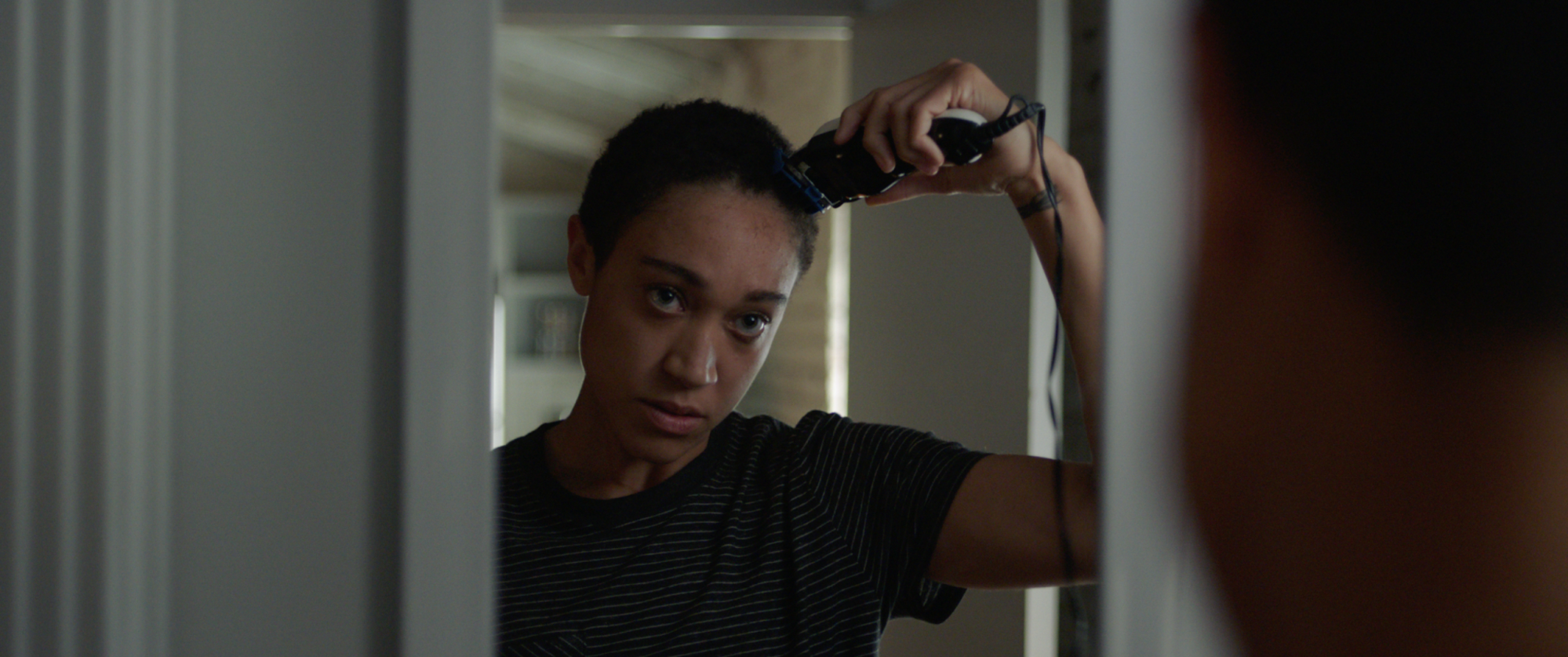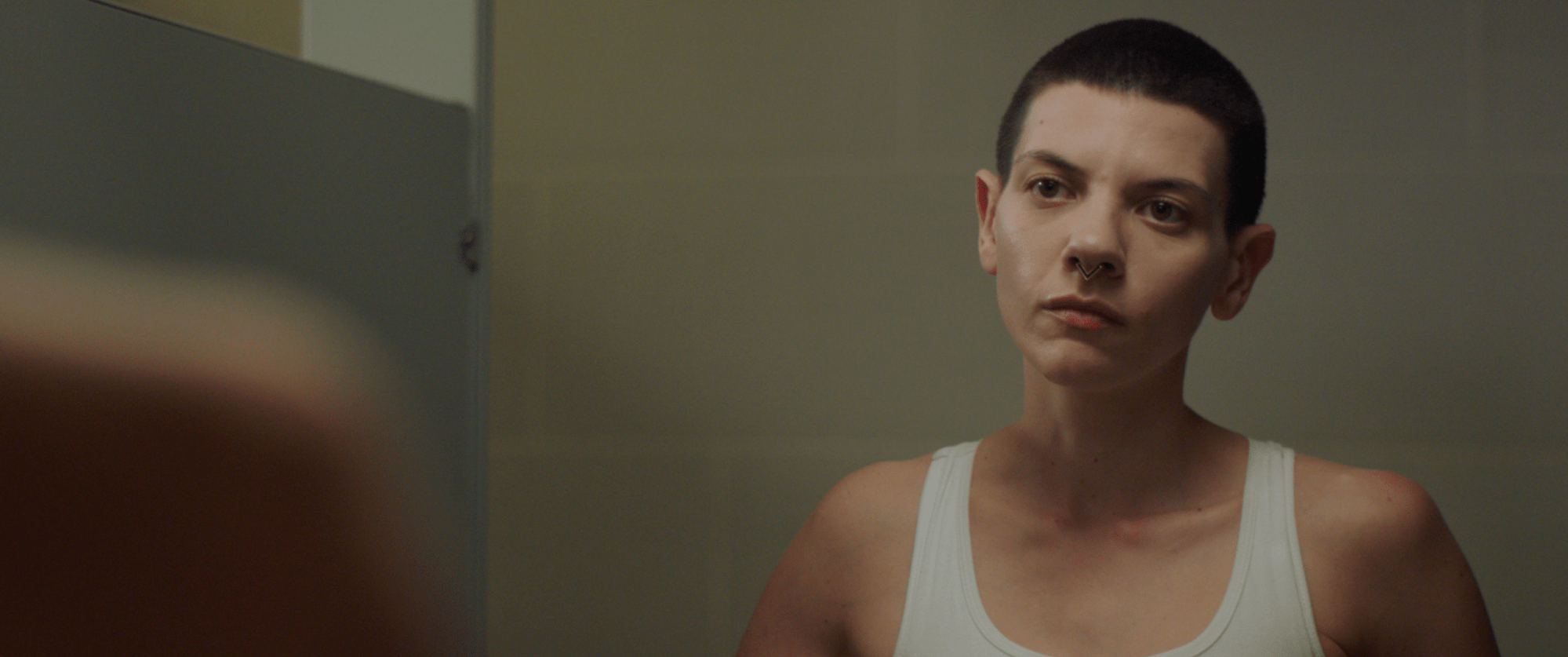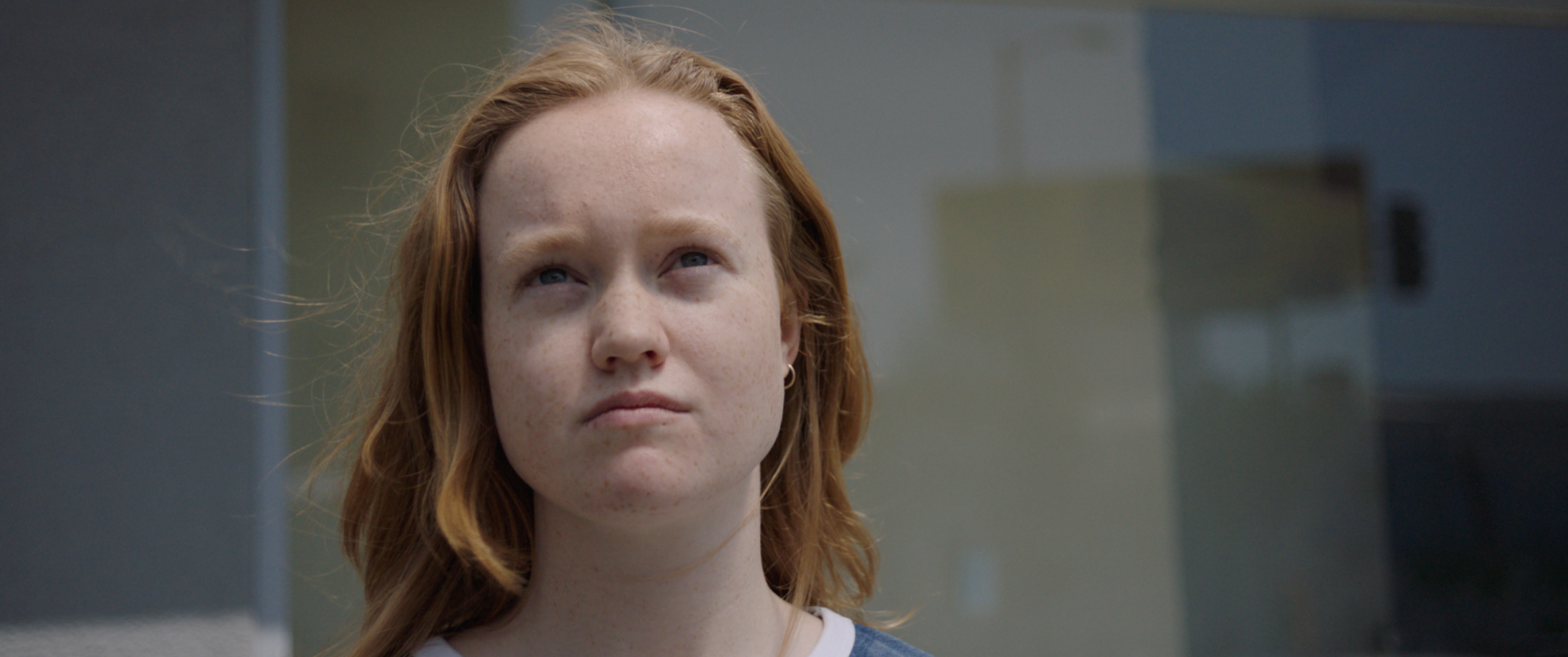Far from being trampled on by the pandemic, London film festival Raindance has instead blossomed into its most accessible ever incarnation, with a diverse roster of independent films screening online for the first time (for free, or for a voluntary donation) to audiences across the UK. Kicking off with an IRL gala last night, this evening Raindance hosts the world premiere of Australian indie Under My Skin. Celebrated by Variety as a “big win for non-binary representation in entertainment,” the film also presents compelling and beautifully shot love story, wrapped in a nuanced depiction of a young artists’ journey toward their true self.
Inspired by director David O’Donnell’s relationship with producer Raynen O’Keefe, who identifies as trans non-binary, the film — which was shot at breakneck speed over 15 days in early 2019 — employs an ambitious device to paint a portrait informed more by the jagged edges of emotion than by simple aesthetics. Lead character Denny is played by four different actors, all non-binary themselves and none looking especially alike.
On the eve of the premiere, i-D gathered all four Dennys on Zoom: Liv Hewson (Bombshell; Santa Clarita Diet; Top of the Lake) speaking from Brisbane, Bobbi Salvör Menuez (Nocturnal Animals; Transparent; I Love Dick) in New York, and newcomers Lex Ryan, in LA, and Brit-in-Brooklyn, Chloe Freeman. They tell us about the personal experiences they wove into Denny, and what it’s like to be part of a renaissance generation, telling new stories about identity in all its kaleidoscopic beauty.
Hi everyone! What attracted each of you to the role of Denny?
Chloe Freeman: Well, firstly, what a privilege to be able to have a non-binary role! This is my first one. Secondly, David choosing four different non-binary actors for the one role, to [show] the spectrum of expression of gender, is so powerful and important.
Liv Hewson: I’ve never played a non-binary character before, so that excited me! And I was excited to meet and spend time working with other non-binary performers.
Bobbi Salvör Menuez: It was one of the first scripts I got after my formal coming out around my chosen name and my gender stuff, so I was in a really tender moment of wondering what kind of roles I would take, what would be interesting to me, and what would be available to me. It made sense to do a film that is really focusing on the trans experience, [and] it felt special to dig into some of the raw emotional stuff in that process.
Lex Ryan: I have a friend who uses the word ‘genderful’ and I’ve kind of taken on that word, because I feel like I contain a multitude of genders. This film was representative of that with Denny. The cool thing about having [actors] who don’t look alike, and present in different ways, is kind of an affirmation that there’s no one way to be non-binary.
“I’ve always been non-binary, so every person I’ve ever dated is queer, whether they like it or not!” – Bobbi Salvör Menuez
What did you bring to the character from your own experience?
Lex Ryan: I actually feel like I’m on Denny’s journey! I just started on testosterone, and I have top surgery in December. So it’s interesting: the moments I was playing in Denny’s journey is where I am now in my life, I guess!
Chloe Freeman: Lex, that’s incredible! I never thought about it like that, because I’m not [on the same journey] and I wasn’t at the time. I was lucky enough to play the moment where Denny revealed, out loud, “I’m struggling with my gender” to the person that they love. I’ve done that moment in my life. I thought a lot about the first time I ever said it out loud, to myself and to someone that I love. I certainly drew on that, it was a very emotional experience.
Liv Hewson: Me and Den have very little in common, [but] the physical dysphoria I definitely recognise. There’s a scene where Den is kind of pulling at their chest. I remember saying to David during filming, “I do that. I’ve done that. I know exactly what that feels like”. So filming that moment was really intimate and confronting.
Bobbi Salvör Menuez: One thing I brought was [that] I have, historically, dated cis men in a period of time where my presentation was more feminine, and the dynamic was viewed as straight. I knew myself to be queer and was out as a queer person. And yet, where does that queerness go in those dynamics? To push up against the hetero male fragility of someone [who] thinks they’re a straight cis man, and you push them to face the reality that maybe they’re a little gay! I’ve always been non-binary, so every single person I’ve ever dated is queer, whether they like it or not! I’m [being] tongue-in-cheek, but that’s my perspective.

Some of the hardest scenes to watch are when Denny’s partner Ryan insinuates they are hiding things, or being fraudulent in some way. They must have been hard to play.
Lex: I’m really lucky in that I have a really supportive community and partner and friends. So in order to play that part of the journey I had to access other things that made me feel shame. When I was a teenager I had a relationship that was secret for two years, because the person I was with was very religious; Catholicism, which is, as we know, very oppressive. This person felt like, “If I’m with you, and I care about you, then I’m going to hell!” From ages 15 to 17, I had this thing that was amazing, that I was really excited about, and also had to constantly keep undercover. That was probably part of what informed [my performance].
Bobbi: It was one of the most intense scenes to play… being attacked by your partner for finding out about this thing, and the way [Ryan] is centering himself as the victim of this ‘deception’. That is tied to such historical transphobic narratives, like, “You were hiding your gender from me, like, how dare you, now I need to kill you!” So that scene is really charged for me. And then to pivot into a sex scene… I was like, this is really complicated! I think bringing in a BDSM element was the key for us in that one.
A major theme of the film is how bodies and aesthetic choices – like having long or short hair, or wearing a dress – are gendered by people’s biases. How do you relate to that?
Liv: I’m a former anorexia sufferer and part of that was gender dysphoria that, at the time, I didn’t have the language to identify. So bodies being looked at, and a discomfort with bodies, is an overarching theme of my life. Everybody has a different relationship with it. For me personally, I grow my hair out because I think it’s a nice colour. I don’t like wearing dresses, just because I don’t, but if I did, it wouldn’t mean that my gender was any different.
I remember struggling with [being the only Denny with long hair] a little bit: I didn’t want people to think of me as the ‘female one’. There’s not one way for a non-binary person to look, you know? If a man grows his hair out, and he still thinks of himself and lives as a man, he’s a man, just with long hair. Like, people don’t get confused watching Lord of the Rings!
“You don’t have to be androgynous in order to be non-binary, you don’t have to look a certain way” – Lex Ryan
Lex: There was a period of time where I [thought] I needed to look as masculine as possible, or else [my identity is] not, like, valid or something. And now I’m like, nah! I also love lipstick, and I love doing my hair. It’s really challenging to, on the one hand, recognise you want to look a certain way, because that’s what feels most accurate and comfortable and authentic and true to you, and then be confronted with the world telling you that doesn’t match up with their idea of what you’re saying your identity is. It’s such bullshit! You don’t have to be androgynous in order to be non-binary, you don’t have to look a certain way.
Chloe: I struggle with it in little [ways] all the time. I’m fairly comfortable in my body, I understand what my gender is, and how I like to express myself, but for a while I was struggling with [whether to] wear a binder or not. It shouldn’t be this huge thing, but given that I am non-binary, I identify as that, you know, a lot of my friends would be like, “You don’t wear a binder?” And I’m like, “Oh, uh, should I?” [Laughs]

What difference did it make to have trans and non-binary people like Raynen on the production team for the film?
Chloe: Unbelievable. It meant so much. So much so that, since the film, I’ve started a production company focused on supporting underrepresented talent behind the camera. They created – and not just [Raynen], but the whole production team, the director, my fellow actors – a space that was so safe. I felt like I could play as an actor, I felt like I was respected in terms of my gender and my choices. There were some intimate moments in the film and they were handled with care. And I think Raynen was at the center of that, so I can’t thank them enough.
Lex: I felt so close to Raynen right away. I felt really safe and supported and held the whole time, and I think having people on set who were very vigilant about including everyone’s pronouns and making sure we were getting things right was great. Raynen was part of creating that very inclusive and kind environment.
Liv: It’s just amazing to have non-binary people involved in as many layers of production as possible. If we’re talking representation in the industry, it matters to me heaps for there to be non-binary writers and directors and producers; that matters to me as much as having non-binary performers be visible. Because storytelling doesn’t just happen with actors, it happens with everybody else.
Bobbi: It’s something that attracted me to the project. There’s many levels to why I think it’s an issue if a crew all looks one way, like, no matter what the film is that they’re making. If a bunch of cis people are making a movie about trans people, or a bunch of white people are trying to make a movie about the Black experience, it’s gonna just be projection. Experiential knowledge is invaluable, and the experiential knowledge of people with unique and intersectional identities is invaluable. And, like, why wouldn’t you want to have a more holistic perspective? It’s gonna make for a better project.

How are you feeling about tonight’s pandemic-proof premiere?
Bobbi: It feels very surreal. Because, historically, what makes premieres feel real [is that] I go somewhere, and try to look nice. It’s a really specific kind of celebratory, buzzing energy. And so to just be in my own apartment feels funny and very, you know, COVID. But just the fact that we get to have a premiere at all is… I’ll take it! It’s special and I’m excited that people are gonna get to see it.
Chloe: I think it’s fantastic for the distribution of film, because more people than ever will probably see it. We should continue to try to get as many people [as possible] to see these incredibly forward-thinking films. But it’s bittersweet. I would absolutely love to be there. I haven’t seen any of the cast or the production for so long, and it’s my first official premiere! I’ll still put a suit on.
Liv: I’m just happy we’re all safe and able to show the film to people safely. The different-ness is a totally fine price to pay for that, I reckon.
What do you hope audiences will take away from the film?
Bobbi: However they experience it, given their own trans literacy or lack thereof, I just hope that it can plant some questions in their mind about their own experience, and maybe about people in their lives who are having a more complicated experience.
Chloe: The more people know about it, the more they are going to feel safe enough to talk about it, and that’s so important.
Bobbi: The power of empathy is really something I believe in, and I hope this film can generate that for people.
Under My Skin has its world premiere at Raindance film festival in London and online on Thursday 29 October at 6.30pm GMT, followed by a Q&A. A repeat screening is on Saturday 31 October at 2pm GMT.
Interviews took place with Liv and Bobbi individually, and with Lex and Chloe together, covering themes that have been compiled for readability, and condensed and edited for clarity.
